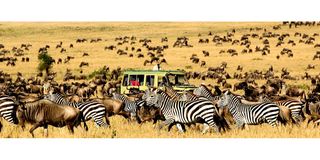Analysis: What is needed to unlock tourism potentials

What you need to know:
- The suggestions are according to analysis by Breakthrough Attorney and PwC Tanzania dubbed: ‘Investment update: A look into the tourism sector in Tanzania – policy, law, incentive, and strategy,’ and ‘The future of Tourism in Tanzania,’ respectively.
Dar es Salaam. Amid the country’s target to reach $6 billion in tourism revenue by 2025, Tanzania is required to upgrade and improve its tourism related infrastructure and services, thus grow the sector and achieve its ambition.
This includes having adequate supply of skilled manpower and capital for infrastructure development, reducing multiplicity in levies and taxes as well as diversified tourism products and sourcing cheap financing.
The suggestions are according to analysis by Breakthrough Attorney and PwC Tanzania dubbed: ‘Investment update: A look into the tourism sector in Tanzania – policy, law, incentive, and strategy,’ and ‘The future of Tourism in Tanzania,’ respectively.
Breakthrough was of the view that inadequate skilled manpower, affects the handling of both the wildlife and tourists management at the hotel level, thus negatively affecting the quality of customer service rendered to tourists.
On the other hand, with lacking investment capital as far as developing the sector’s infrastructures which includes roads, decent accommodation facilities, and investing into researching, and other such environment, it is harder for the sector to thrive.
Other areas that legal experts think should be appropriately addressed for the sector to flourish, include addressing poaching issues as the awful act reduces the number of animals in National parks and Game reserves.
But Ms Zainab Msimbe, a partner with PwC Tanzania doubts the sector’s competitiveness and sustainability as it faces persisted bottlenecks that need to be tackled if the sector is to be improved.
“These include limited access to cheap financing, inadequate tourism infrastructure, a multiplicity of levies, insufficient diversity in product offerings, and lack of sufficient hotel and airport facilities,” she said.
According to her, Tanzania needs to re-examine its tourism taxes and levies so as to reduce multiplicity and create competitiveness across the region as the country is deemed to be an expensive destination compared with South Africa and Kenya.
Tanzania ranks higher than Kenya with respect to safety and security, but lower than Kenya when it comes to tourist service infrastructure.
“For instance, the drive from Dar es Salaam to Selous Game Reserve, the largest game reserve in Africa, is bumpy and long, taking an average of 7-8 hours,” the report reads in part.
Therefore, the study adds: “Flying is a better option and the fastest way to get to Selous. However, it is the most expensive and hence suits more high-end tourists.”
On the other hand, more effort is required to attract private sector investment in hotels and ensure diversity in the offered services.
The current hotel capacity in Mainland and Zanzibar cannot cater for the expected influx of 5 million tourists by 2025, and that improvement in efficiencies and flight handling capacity at the airports is another area which requires fixing.
Automation of immigration procedures in Zanzibar and Kilimanjaro Airports will help fast track the process. Instead of having a paperwork checking system, barcodes should be set to scan all the documents. This will help to reduce unnecessary queues at the airports during high season.
Other than wildlife and beaches, the Ministry for Tourism should spearhead the innovation of new tourist attractions.
Media reports indicate that major source markets for Tanzania’s international tourism are the USA, which accounts for 13.2 percent, the UK representing at least 9.5 percent, with the remaining percentage representing other countries.
Data captured by the immigration department by August this year, indicates that in the period between January to July this year, Tanzania registered 742,133 tourists, a 62.7 percent increase compared to the same period last year. It is noted that Tanzania ranked tenth among fifty African countries in tourism growth. By, April 2020, tourism earnings accounted for more than 24 percent of the total share of exports, making tourism the second largest foreign exchange earner after agriculture.




